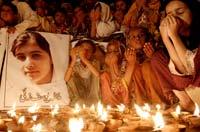A symbol of courage

In the face of terror, 15-year-old MalalaYousufzai risked her life to speak out for the rights of girls everywhere.
For that she was shot in the head by a Taliban gunman in response to her campaign against the destruction of girls schools in Pakistan.
Now, Malala’s courage has triggered a petition to get her the Nobel Peace Prize. The petition was initiated by Canada-based activist Tarek Fatah.
Only certain people, like a Member of Parliament, are allowed put forward nominations. To make a major statement and to show that Canadians believe in Malala’s work, Fatah writes, all Canadian federal party leaders must unanimously nominate Malala for her incredible work and bravery.
Liberal Canadian leader Bob Rae backed the petition and Canada’s Immigration Minister Jason Kenney voiced his support for it as well.
“A Nobel Peace Prize for Malala will send a clear message that the world is watching and will support those who stand up for gender equality and universal human rights that includes the right of education for girls”, the petition reads.
Philosopher Richard Dawkins has also shown his support by signing the petition and has urged his followers on social networking site Twitter to share the petition and bring the Nobel closer to Malala.
The Pakistani schoolgirl, who miraculously survived a Taliban murder attempt, has become a beacon of courage for all those who struggle against violence and intolerance with dignity and peace.
She rose to international prominence in 2009, aged just 11, writing a blog for the BBC Urdu service chronicling the terror of life under Taliban rule in Swat, the beautiful valley in northwestern Pakistan where she lived.
The militants had taken over the area, which Malala affectionately called “My Swat”, in 2007 and imposed their brutal, bloody interpretation of Islamic shariah law.
Opponents were murdered, people were publicly flogged for supposed breaches of sharia, women were banned from going to market — and girls were stopped from going to school.
Her blog, written anonymously with the clarity and frankness of a child, opened a window for Pakistan onto the miseries being perpetrated within the country’s borders.
In January 2009 she wrote about her school telling the girls to come in normal clothes, rather than their uniform.
“So I decided to wear my favourite pink dress. Other girls in school were also wearing colourful dresses. During the morning assembly we were told not to wear colourful clothes as the Taliban would object to it,” she wrote.
Her struggle resonated with tens of thousands of girls denied an education by Islamist militants across northwest Pakistan, where the government has been fighting local Taliban since 2007.
When the army launched an offensive to oust the Taliban, Malala fled Swat with her family led by her father Ziauddin, school principal and himself a seasoned campaigner for education.
After this difficult period she resumed her work promoting education, and last year she received the first national peace award from the Pakistani government and was also nominated for the International Children’s Peace Prize.
But on October 9 the men with guns decided they could no longer tolerate the girl with a book and sent two hitmen to murder Malala on her school bus.
The Pakistani Taliban claimed the attack and warned any woman who stood up to them would suffer a similar fate.
Incredibly she survived — the bullet grazed her brain and travelled through her neck before lodging in her shoulder — and as she lay fighting for life in hospital, Pakistan and the world united in horror.
After surgery in Pakistan, Malala was flown for long-term treatment in Britain, where the consulate in Birmingham has been flooded with cards for the 15-year-old from well-wishers around the world.
As she recovers, now reunited with her family, her courage and defiance are inspiring girls in her home country — where less than half of women can read and write — to pursue their studies despite the challenges of Islamist militants and poverty.
Leave a comment









